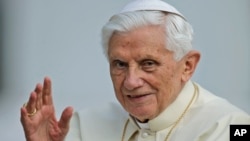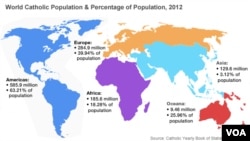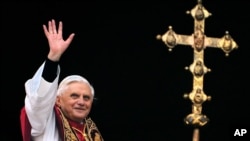DAKAR —
Among the cardinals who could succeed Pope Benedict XVI are two prominent Africans - both from West Africa and both seen as strong contenders.
Africa is one of the few parts of the world where Catholicism is on the rise, and some think it is time for a non-European and possibly black African pope. But for many African Catholics, the new pope’s race is far less important than competence and conviction in leading the Church.
Even in 2005 when Pope Benedict was elected, Cardinal Francis Arinze of Nigeria was seen as a possible successor to John Paul II. Arinze, now 80, is again considered a strong candidate as is 64-year-old Cardinal Peter Kodwo Appiah Turkson of Ghana.
The latest Vatican statistics show that between 2009 and 2010 on most continents the number of Catholics dropped - increasing only in southeast Asia and in Africa. The number of seminarians has also dropped in Europe and the Americas, but has risen in Asia and Africa.
The pope's resignation triggered anew the question of whether it is time for a non-European pope - notably a black African, after centuries of European popes, mostly Italian. But Catholics in Senegal and Ghana say they see the leader’s race as largely irrelevant.
“For us in the Catholic Church it does not play any role at all and it should not play any role at all," said Gabriel Charles Palmer-Buckle, archbishop of Accra, the capital of Ghana. "The word Catholic means that all cultures, all races, all peoples are united in one body so it shouldn’t play a role whether the person is black, white, or yellow.”
Cardinal Théodore Adrien Sarr, archbishop of Dakar, will be among the cardinals to elect the next pope. Speaking to reporters on Monday he said it’s not the pontiff’s ethnicity that counts but his strength and conviction to lead the Church.
He said he has his doubts that the moment has come for a black African pope.
(Source: Reuters)
While there are no official candidates, here are the "papabili,'' potential popes, most frequently mentioned recently. The list is in alphabetical order.
He says this question has been with us for a long time now. "Is the Catholic Church ready for a black African leader? Is the world ready for a black African pope? I’ve got my doubts," he says. "It’s true - we’ve got the case of Barack Obama." Still, he says, given how Africans are generally seen and treated, it is not very likely.
Dominique Basse, a member of the Church of Uganda’s Martyrs in Dakar, says having a black African pope would certainly enhance Africa’s place in the world. " It’s like when a president who’s of your party comes to power," he says, "it enhances your group. But what’s most important is that the new Pope be able to help us all grow in our faith and be able to strengthen the Catholic community."
On Monday as parishioners gathered for a daily mass at the Church of Uganda’s Martyrs, a few chatting about Pope Benedict’s resignation said they saw the decision as wise and noble.
But for some, Basse said, Africa’s culture of chiefdom remains a strong force, and they were put off by the pope’s move.
He says for some the decision is troubling, provoking questions about what might have been behind it. Basse says some people are still quite attached to the concept of a chief and the chief does not step down.
At the second special assembly of bishops on Africa, in 2009, Pope Benedict talked about the role of the church as the continent faces religious fundamentalism, poverty, injustice, and war. He said part of the church’s calling is to reconcile different ethnic, linguistic and religious groups.
Bishop Palmer-Buckle of Accra says while Africa has particular challenges and it is important to discuss them in such assemblies, the Catholic Church is not about serving only certain “constituencies”.
“I don’t think that’s what the Catholic Church is about," he says. "The pope is definitely going to be a universal spiritual leader for the whole world. And he must be as concerned about Africa as he would be concerned about Europe as he would be concerned about Latin America or Asia.”
Pope Benedict XVI will step down on February 28. Cardinals from around the world will gather in Rome where the process to elect his successor will begin the following day.
Photo Gallery: Pope Benedict Resigns
Africa is one of the few parts of the world where Catholicism is on the rise, and some think it is time for a non-European and possibly black African pope. But for many African Catholics, the new pope’s race is far less important than competence and conviction in leading the Church.
Even in 2005 when Pope Benedict was elected, Cardinal Francis Arinze of Nigeria was seen as a possible successor to John Paul II. Arinze, now 80, is again considered a strong candidate as is 64-year-old Cardinal Peter Kodwo Appiah Turkson of Ghana.
The latest Vatican statistics show that between 2009 and 2010 on most continents the number of Catholics dropped - increasing only in southeast Asia and in Africa. The number of seminarians has also dropped in Europe and the Americas, but has risen in Asia and Africa.
The pope's resignation triggered anew the question of whether it is time for a non-European pope - notably a black African, after centuries of European popes, mostly Italian. But Catholics in Senegal and Ghana say they see the leader’s race as largely irrelevant.
“For us in the Catholic Church it does not play any role at all and it should not play any role at all," said Gabriel Charles Palmer-Buckle, archbishop of Accra, the capital of Ghana. "The word Catholic means that all cultures, all races, all peoples are united in one body so it shouldn’t play a role whether the person is black, white, or yellow.”
Cardinal Théodore Adrien Sarr, archbishop of Dakar, will be among the cardinals to elect the next pope. Speaking to reporters on Monday he said it’s not the pontiff’s ethnicity that counts but his strength and conviction to lead the Church.
He said he has his doubts that the moment has come for a black African pope.
Pope Frontrunners for Now
Pope Frontrunners for Now(Source: Reuters)
While there are no official candidates, here are the "papabili,'' potential popes, most frequently mentioned recently. The list is in alphabetical order.
- Joao Braz de Aviz (Brazil, 65) brought fresh air to the Vatican department for religious congregations when he took over in 2011. He supports the preference for the poor in Latin America's liberation theology, but not the excesses of its advocates.
- Timothy Dolan, (USA, 62) became the voice of U.S. Catholicism after being named archbishop of New York in 2009. His humour and dynamism have impressed the Vatican, where both are often missing.
- Marc Ouellet (Canada, 68) is effectively the Vatican's top staff director as head of the Congregation for Bishops. He once said becoming pope "would be a nightmare.''
- Gianfranco Ravasi (Italy, 70) has been Vatican culture minister since 2007 and represents the Church to the worlds of art, science, culture and even to atheists.
- Leonardo Sandri (Argentina, 69) is a "transatlantic'' figure born in Buenos Aires to Italian parents. He held the third-highest Vatican post as its chief of staff in 2000-2007.
- Odilo Pedro Scherer (Brazilia, 63) ranks as Latin America's strongest candidate. He's Archbishop of Sao Paolo, largest diocese in the largest Catholic country.
- Christoph Schoenborn (Austria, 67) is a former student of Pope Benedict with a pastoral touch the pontiff lacks. The Vienna archbishop has ranked as papal material since editing the Church catechism in the 1990s.
- Angelo Scola (Italy, 71) is archbishop of Milan, a springboard to the papacy, and is many Italians' bet to win. An expert on bioethics, he also knows Islam as head of a foundation to promote Muslim-Christian understanding.
- Luis Tagle (Philippines, 55) has a charisma often compared to that of the late Pope John Paul. He is also close to Pope Benedict after working with him at the International Theological Commission.
- Peter Turkson (Ghana, 64) is the top African candidate. Head of the Vatican justice and peace bureau, he is spokesman for the Church's social conscience and backs world financial reform.
Dominique Basse, a member of the Church of Uganda’s Martyrs in Dakar, says having a black African pope would certainly enhance Africa’s place in the world. " It’s like when a president who’s of your party comes to power," he says, "it enhances your group. But what’s most important is that the new Pope be able to help us all grow in our faith and be able to strengthen the Catholic community."
On Monday as parishioners gathered for a daily mass at the Church of Uganda’s Martyrs, a few chatting about Pope Benedict’s resignation said they saw the decision as wise and noble.
But for some, Basse said, Africa’s culture of chiefdom remains a strong force, and they were put off by the pope’s move.
He says for some the decision is troubling, provoking questions about what might have been behind it. Basse says some people are still quite attached to the concept of a chief and the chief does not step down.
At the second special assembly of bishops on Africa, in 2009, Pope Benedict talked about the role of the church as the continent faces religious fundamentalism, poverty, injustice, and war. He said part of the church’s calling is to reconcile different ethnic, linguistic and religious groups.
Bishop Palmer-Buckle of Accra says while Africa has particular challenges and it is important to discuss them in such assemblies, the Catholic Church is not about serving only certain “constituencies”.
“I don’t think that’s what the Catholic Church is about," he says. "The pope is definitely going to be a universal spiritual leader for the whole world. And he must be as concerned about Africa as he would be concerned about Europe as he would be concerned about Latin America or Asia.”
Pope Benedict XVI will step down on February 28. Cardinals from around the world will gather in Rome where the process to elect his successor will begin the following day.
Photo Gallery: Pope Benedict Resigns


